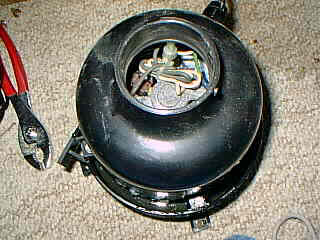|
This is probably the number two most common cause of
GFCI tripping. Because of the nature of the plumbing associated with blowers, they are
extremely vulnerable to water feeding back through the air tubes, and into the motor itself.
When this happens, the GFCI should detect the electrical current going to ground inside the motor,
and automatically disconnect the power. Unfortunately for the blower, by the time that this
happens, it is time to replace it.
Blower Motor replacement section.
The other problem with GFCI tripping on wet blower
motors, is that it may not be consistent. If the water that has entered the blower cavity is
relatively clean and free of sanitizer residue, then the tripping may cease once the blower has
dried out.
 |
|
|
From the business end, this blower appears
normal...
|
But not from this end... This is why the GFCI
shuts down. The moment this blower is turned on, it sucks the water straight into the motor
assembly, creating a ground fault.
|
|
|
Digital Spa Controls
Most controllers of this type will automatically purge
the blower air lines in an effort to ensure the circulation, heating, and filtering of ALL of the
water contained in the spa. Typically it will turn on sometime in the filtering cycle, like
once an hour or half-hour for 30 seconds or so.
So, depending on the type, brand, and firmware
programming that is embedded in your controller, the automatic purge cycle of the blower can
sometimes trip the GFCI when you least expect it.
To test this, simply unplug the blower from the spa
controller, and see if the GFCI stops tripping, or, simply activate the blower manually and see if
it trips the GFCI.
|
|
|
Air Button Spa Controls
There are two separate types of these controls.
One type will have a separate button for each component of the spa, such as one for jets, one for
the blower, etc. The other is the "function" type of button that uses a single button for
both.
Multiple button controls; One button for each
device
Many spa controls are
built this way. Simply unplug the blower from the controller, and turn on the GFCI.
Operate all other spa equipment, including the heater. If it doesn't trip the breaker, then
you've isolated the ground fault problem, and need to repair or replace the blower.
Single Button Controls; "Function Select
Types"
Below is an example of
function type spa side controls. One button is for function of the equipment, and the other
is for the spa light. The third "Morgan" spa brand side control on the right is included
because it has a third button to control the speed of one of the pumps. However, most other
Morgan air button side controls will dedicate this third button to control the blower speed
instead.
On some spas, there may be no side control panel, only a
single air push button for function control at the spa side.
The three spa control packs pictured, Len Gordon,
Morgan, and Brett Aqualine, are probably the most popular function type spa controls ever
produced.
Troubleshooting
This type of spa is controlled by pushing the button
multiple times to achieve the desired operation of the equipment, jets or blower. The
sequence of operation of this type of spa control is normally:
|
Press
|
Action
|
|
First
|
Jets and Blower ON.
|
|
Second
|
Jets Only ON. Blower is
OFF.
|
|
Third
|
Blower Only ON. Jets are
OFF.
|
|
Fourth
|
Jets and Blower are OFF.
|
This control system, when powered up, may fool you into
thinking that the pump is causing the GFCI to trip off line. The best solution is to unplug
the blower from the controller, and cycle the controller through all of the positions. If the
GFCI doesn't trip off line, then you've found your problem.
|
|